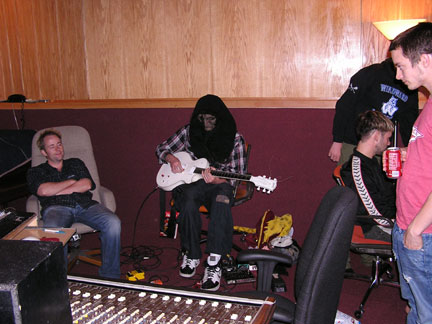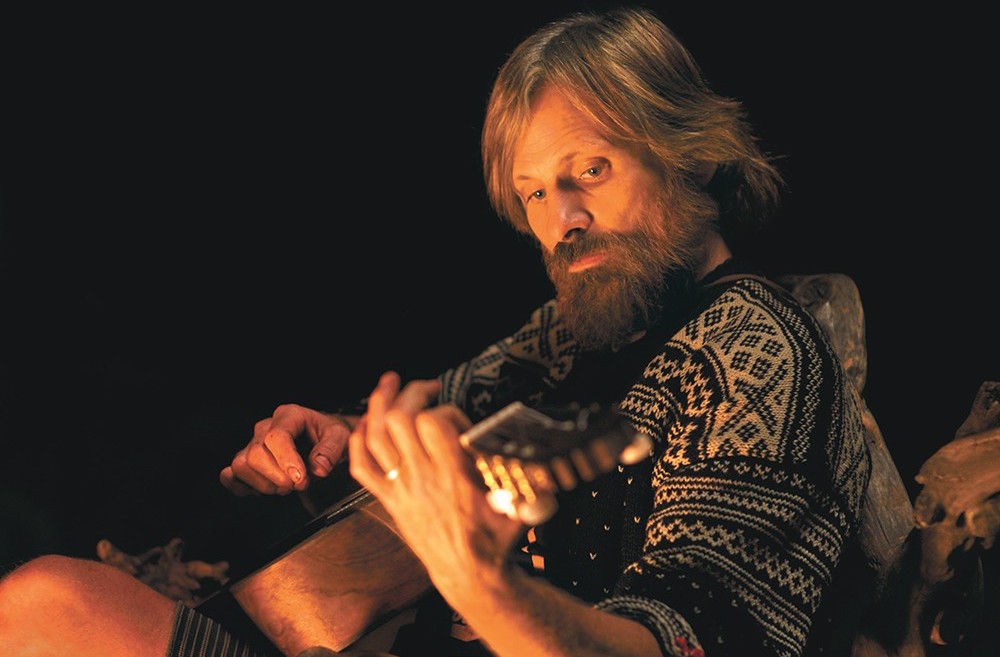We’ve all been there: Sitting bolt upright in bed, suddenly remembering a pop culture experience we had years ago—particularly a then-negligible detail which now seems entirely surreal—and suffering future sleepless nights after confirming the detail in the morning. It’s Time to Talk About is our way of bringing these issues to light in hopes that such conversations can become easier in the future. Sometimes it’s better to talk about it.
If you know anything about Viggo Mortensen beyond his film work, you know he’s committed to the arts. In fact, even if you only know Viggo Mortensen from his film work, you probably know how committed he tends to be—I’ve never seen him phone in a performance, and more often than not, dude’s fluently speaking foreign (and sometimes fictitious) languages and hanging dong or cheek in adaptations of his favorite literary works or in groundbreaking original screenplays.
Beyond that, Veeg’s dipped his toes in just about everything from writing and publishing poetry (he founded Perceval Press mainly as a means of putting out work by unpublished poets) to compiling his own paintings and photography he accumulated while shooting on location, much of which highlights the work of indigenous or otherwise underrepresented voices. I heard somewhere that the occasional out-of-place breathtaking shot in the Lord of the Rings movies was Viggo’s doing, commandeering the camera from the plebe Peter Jackson who was seemingly hired due to his prior experience constructing monsters.
But Green Book and its ensuing racially tonedeaf press tour weren’t Viggo’s first questionable career choice—dating back to the early ’90s, the actor has been dropping album-length collaborations with Buckethead, the prog-metal guitarist mostly known for the combination kabuki mask/KFC bucket he wears on his head while performing with the likes of Guns n’ Roses, System of a Down, and Bassnectar (not to mention playing lead guitar on “Firebird” from the Mighty Morphin Power Rangers: The Movie OST). The duo put out six records together (and one comp) bookended by 1997’s One Less Thing to Worry About and 2011’s Reunion—but 2002’s Pandemoniuminamerica is the one we most urgently need to talk about.
First off, it’s worth noting the punk credit embedded in the liner notes of his ’90s recordings—namely contributions from the vocalists of the two West Coast punk bands with the shortest names: his then-wife Exene Cervenka of X and Donita Sparks of L7. Both artists (as well as Viggo’s dog Brigit) are actually credited on his albums up through 1999’s One Man’s Meat (and its ensuing live album) despite Viggo and Exene splitting in 1998—Buckethead, though, remains Vig’s wingman through and through, Pandemonium seemingly serving as the pair’s reinventive record featuring vocal contributions from Elijah Wood, Dominic Monaghan, and Billy Boyd—three of LotR’s four hobbits (the album was released the same year as Return of the King—and a reading from Noam Chomsky.
It’s endlessly unsettling—it sounds more convincingly apocalyptic than the adaptation of The Road Mortensen would shoot six years later. It doesn’t get much more skin-crawlingly weird than hearing Viggo whisper William Blake’s America a Prophecy over his own atonal piano and aimless harmonica on the title track.
Rounded out by multi-instrumentalists Travis Dickerson and Henry Mortinson (Son of Viggo), the record credits just about everyone taking up a broad range of recording responsibilities, with Boyd playing bass and percussion on a few tracks, Wood playing piano, Mortensen Sr. playing harmonica, something called the “lesliemonica,” and, even more inexplicably, the wheelchair. For the most part, the hobbits seem to be onboard just to contribute to the swirling undercurrent of spectral groaning lining each track. On top of all that, nearly every song is peppered with readings from Rumi, Jonathan Swift, or William Blake, in addition to Chomsky providing his own words on “Cuba on Paper.”
And then there’s the music itself. The record starts off slowly, blending ambient guitar, a seemingly random smattering of piano and organ keys, and Viggo’s floating falsetto. And…it kind of just remains that for the ensuing forty minutes, swapping in and out bizarre instrument choices, literary readings, and spectral backing vocals. It’s endlessly unsettling—it sounds more convincingly apocalyptic than the adaptation of The Road Mortensen would shoot (full rear nudity) six years later. It doesn’t get much more skin-crawlingly weird than hearing Viggo whisper Blake’s America a Prophecy over his own atonal piano and aimless harmonica on the title track, or the way-off-color playfulness of “Red River Valley.” It’s truly nightmarish the way each one of these three-minute tracks fades out only for the next to open with a nearly identical ambient moan, as if we’re entering yet another level of hell.

And in case you somehow forgot, this is a collaboration with Buckethead. It could be anyone aimlessly noodling over all the other aimless noodling. I could only find one interview Viggo ever did about the project, which he did with IGN in 2004 (gracefully preserved by the Way Back Machine) wherein most of the write-up is block-text quote from Mortensen giddily praising his collaborator. “I don’t think he ever messes up, he’s so amazing,” Viggo corrects himself immediately after explaining their “experimental” recording style. “He just inspires me and I feel like I can try different things, too or even suggest stuff,” he continues. “He’s great. I’m so glad that in my life I’ve gotten to know him a little and work with him. He’s one of the most original, genuine, most sincere, and most gifted individuals I’ve met in my life. He’s incredible.”
After explaining that the two met through a mutual recording job with educational recording company Dove Audio, the praise continues: “Being in the studio with him and just spending a day at work, I walk out of there always feeling a little lighter, all my problems and responsibilities just feel a little less daunting somehow. It’s like going for a nice walk in the woods. You just feel a little more able to deal with [things] ’cause you know that you’ve used your time well and gotten something special out of the day. I feel that working in the studio and in particular working with him.” And on and on and on.
Listening to Pandemoniumfromamerica I was reminded a bit of Caleb Landry Jones’ recently released debut The Mother Stone, just in that it’s the first I heard from a screen persona channeling their artistic voice through their truly weird musical project (I was also reminded of that Movie Premieres Unlimited account in the way the record encapsulates a specific moment of early-aughts culture in a surreal whirlwind of celebrity). Fortunately, Caleb was able to work with Sacred Bones and a well-established publicity company to ensure that the narrative surrounding his record will be well-documented by a handful of music and culture publications for future generations to uncover should he cease putting out music. Viggo’s music, on the other hand, will remain something of a mystery. FL







